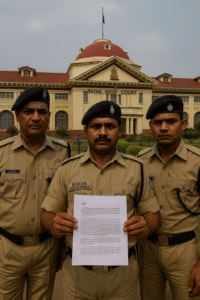Simplified Explanation of the Judgment
The Patna High Court delivered an important judgment on 22 March 2021 in a criminal revision case (Cr. Rev. No. 14 of 2019) arising from Naya Ram Nagar P.S. Case No. 93 of 2012, Munger district. The petitioners—family members of one of the accused—challenged the seizure of cash, documents, and property made by police during an investigation under the Unlawful Activities (Prevention) Act (UAPA), 1967 and the Arms Act, 1959.
The prosecution alleged that a group of individuals were supplying arms and explosives to Naxals. Acting on this information, police ambushed a vehicle near Sweta Bengal Sweets, arrested two persons, and seized a pistol and some alleged “Naxal literature.” Later, they searched the house of one accused and seized items including a laptop, cash, ATM cards, Sahara deposit bonds, and passbooks.
The police sought post-facto approval of this seizure from the Designated Authority under Section 25 of the UAPA, which was later confirmed. The petitioners (parents, brother, and wife of the accused) contended that the seizure of their personal property was illegal and without jurisdiction. They argued that Section 25 of the UAPA applies only to “terrorist acts” covered under Chapters IV and VI of the Act—not to general offences like those alleged in this case under Sections 10 and 13 of UAPA and Section 414 IPC.
The Designated Authority and the lower appellate court had upheld the seizure, but on revision, the Patna High Court set aside the orders, holding the entire exercise to be illegal, arbitrary, and beyond jurisdiction.
Justice Birendra Kumar observed that Section 25 of UAPA can be invoked only when there are reasonable grounds to believe that seized property represents “proceeds of terrorism” and that the offence investigated falls under Chapters IV or VI. In this case, no such terrorist act or organization had been identified, and no prior approval from the Director General of Police was obtained before the seizure, as required by law. Therefore, the seizure and its confirmation were held null and void.
The Court emphasized that “reason to believe” must rest on specific, reliable, and relevant information. Since the record showed no such evidence linking the seized items to terrorism, the entire seizure under Section 25 of the UAPA lacked legal foundation. Moreover, the Court found that the Designated Authority failed to apply its mind while confirming the seizure and simply acted mechanically.
The Court also noted that even the alleged “unlawful association” had not been declared unlawful under Section 3 of the UAPA. Thus, the charges under Sections 10 and 13 (membership of unlawful association and unlawful activities) were not properly attracted.
Accordingly, the Court allowed the revision petition, quashed the seizure orders, and directed the release of the seized property within ten days. It further ordered that if the release was delayed, the petitioners would be entitled to compensation of ₹10,000 per day. The Court also granted liberty to initiate damages proceedings against the erring officers for causing mental, physical, and economic distress.
Significance or Implication of the Judgment
This judgment is a strong reminder that powers under special laws like the UAPA cannot be used arbitrarily. The Court clarified that seizure of property under Section 25 of the UAPA requires strict compliance with statutory conditions, including prior approval from the Director General of Police and proof that the seized assets are linked to terrorism.
For law enforcement agencies, this ruling reinforces the need for careful adherence to procedural safeguards before invoking anti-terror laws. The misuse of UAPA provisions in cases lacking a clear nexus with terrorism can lead to judicial censure and liability for compensation.
For the general public, the decision safeguards citizens’ constitutional right to property and due process. It underlines that even in sensitive cases, authorities cannot seize assets without legal justification. The judgment also highlights the judiciary’s role in protecting individuals from overreach and ensuring that anti-terror laws are not used to target ordinary citizens.
Legal Issue(s) Decided and the Court’s Decision
- Whether Section 25 of the UAPA was applicable to this case.
Decision: No. The Court held that Section 25 applies only to offences under Chapters IV and VI of the UAPA (terrorist acts and terrorist organizations). Since the alleged offences were under Sections 10 and 13 (unlawful activities), Section 25 did not apply. - Whether the investigating officer had proper jurisdiction and prior approval for the seizure.
Decision: No. The Court found that prior approval of the Director General of Police was mandatory but not obtained, making the seizure illegal. - Whether there was sufficient reason to believe that the seized property was “proceeds of terrorism.”
Decision: No. The Court observed that no specific or credible evidence linked the seized items to terrorism. - Whether the Designated Authority applied its mind while confirming the seizure.
Decision: No. The Authority confirmed the seizure mechanically without recording reasons or evidence-based satisfaction. - Final Outcome:
The Court set aside the seizure order, quashed the lower appellate order, and directed immediate release of all seized property. Compensation and right to sue for damages were also granted.
Judgments Relied Upon or Cited by Court
- The Court primarily relied on the text and interpretation of Section 25 of the Unlawful Activities (Prevention) Act, 1967.
Case Title
Petitioners v. State of Bihar & Ors.
Case Number
Criminal Revision No. 14 of 2019
(Arising out of Naya Ram Nagar P.S. Case No. 93 of 2012, Munger)
Citation(s)
2021(2) PLJR 710
Coram and Names of Judges
Hon’ble Mr. Justice Birendra Kumar
Date of Judgment: 22 March 2021
Names of Advocates and who they appeared for
- For the petitioners: Mr. Sandeep Kumar, Mr. Arvind Kumar, Mr. Anil Kumar Roy, Advocates
- For the respondents: Mr. Umanath Mishra, A.P.P.
Link to Judgment
NyMxNCMyMDE5IzEjTg==-PGlO2NsphFM=
If you found this explanation helpful and wish to stay informed about how legal developments may affect your rights in Bihar, you may consider following Samvida Law Associates for more updates.








